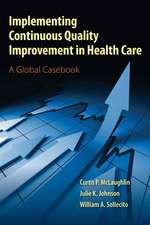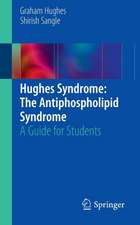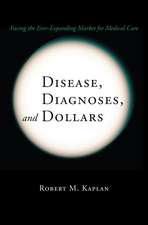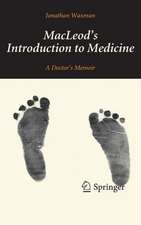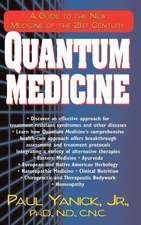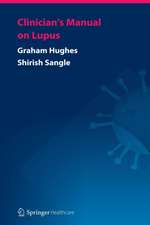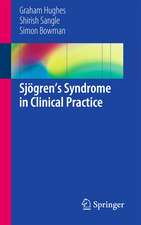Understanding Hughes Syndrome: Case Studies for Patients
Autor Graham Hughesen Limba Engleză Paperback – mar 2009
The discovery of ‘sticky blood’ (commonly known as antiphospholipid syndrome or ‘Hughes Syndrome’) came out of years of observation of patients who had developed lupus. Many specialists in the 1970s were interested in the neurological aspects of lupus, and Dr Hughes, among others, spent a number of years studying the mechanisms of brain inflammation.
In the mid 1970s, Hughes observed a number of young women with a form of viral paralysis, where interestingly many of them carried an antibody in their blood actually directed against ‘phospholipid’ – one of the components of brain and spinal cord. It quickly became apparent that individuals who had "anti-phospholipid antibodies" suffered from a tendency not only to develop brain and spinal cord symptoms, but also a tendency to develop both vein and artery thrombosis.
As investigation continued it became apparent that these symptoms were not just confined to lupus patients, but occurred in others too, specifically those with severe migraines, with repeated strokes, with memory loss, and in women with recurrent miscarriage.
Preț: 138.96 lei
Nou
Puncte Express: 208
Preț estimativ în valută:
26.60€ • 27.94$ • 22.35£
26.60€ • 27.94$ • 22.35£
Carte disponibilă
Livrare economică 19 februarie-05 martie
Preluare comenzi: 021 569.72.76
Specificații
ISBN-13: 9781848003750
ISBN-10: 1848003757
Pagini: 114
Ilustrații: XIV, 94 p.
Dimensiuni: 127 x 203 x 11 mm
Greutate: 0.14 kg
Ediția:2009
Editura: SPRINGER LONDON
Colecția Springer
Locul publicării:London, United Kingdom
ISBN-10: 1848003757
Pagini: 114
Ilustrații: XIV, 94 p.
Dimensiuni: 127 x 203 x 11 mm
Greutate: 0.14 kg
Ediția:2009
Editura: SPRINGER LONDON
Colecția Springer
Locul publicării:London, United Kingdom
Public țintă
Popular/generalDescriere
Along with AIDS, antiphospholipid syndrome was the major medical discovery of the late 20th century, so for many it is still deemed a ‘new’ disease.
The discovery of ‘sticky blood’ (commonly known as antiphospholipid syndrome or ‘Hughes Syndrome’) came out of years of observation of patients who had developed lupus. Many specialists in the 1970s were interested in the neurological aspects of lupus, and Dr Hughes, among others, spent a number of years studying the mechanisms of brain inflammation.
In the mid 1970s, Hughes observed a number of young women with a form of viral paralysis, where interestingly many of them carried an antibody in their blood actually directed against ‘phospholipid’ – one of the components of brain and spinal cord. It quickly became apparent that individuals who had "anti-phospholipid antibodies" suffered from a tendency not only to develop brain and spinal cord symptoms, but also a tendency to develop both vein and artery thrombosis.
As investigation continued it became apparent that these symptoms were not just confined to lupus patients, but occurred in others too, specifically those with severe migraines, with repeated strokes, with memory loss, and in women with recurrent miscarriage.
The discovery of ‘sticky blood’ (commonly known as antiphospholipid syndrome or ‘Hughes Syndrome’) came out of years of observation of patients who had developed lupus. Many specialists in the 1970s were interested in the neurological aspects of lupus, and Dr Hughes, among others, spent a number of years studying the mechanisms of brain inflammation.
In the mid 1970s, Hughes observed a number of young women with a form of viral paralysis, where interestingly many of them carried an antibody in their blood actually directed against ‘phospholipid’ – one of the components of brain and spinal cord. It quickly became apparent that individuals who had "anti-phospholipid antibodies" suffered from a tendency not only to develop brain and spinal cord symptoms, but also a tendency to develop both vein and artery thrombosis.
As investigation continued it became apparent that these symptoms were not just confined to lupus patients, but occurred in others too, specifically those with severe migraines, with repeated strokes, with memory loss, and in women with recurrent miscarriage.
Cuprins
The Brain.- Late for the Wedding.- Falling Over.- Diplomatic Epilepsy.- Weak Legs.- “Multiple Sclerosis” …….- Teenage Migraine…….- Getting Only Half the Picture.- Difficult Crossword Puzzles…….- Playing the Wrong Notes…….- Speaking Gibberish…….- I Lost My Sense of Smell…….- Movement, Jerks and Twitches…….- Mad Cow Disease…….- St. Vitus Dance…….- Parkinson's Disease…….- Missing the Target…….- The Headmistress Who Forgot…….- “Personality Disorder” in a 4-Year-Old …….- To Sleep … Perchance to Dream.- …and Other Organs.- The Lung.- The Skin.- The Liver.- The Heart.- Backpacking in Australia.- Short of Breath in Scandinavia…….- The Blood.- The Adrenal Glands.- The Digestive System.- The Reproductive System.- The Limbs.- Pain in the Foot (“Toelitis”).- Ear, Nose and Throat.- The Kidneys.- “Multi-System Failure” The computer has crashed..- Pregnancy, Miscarriage, Infertility.- Eleven Miscarriages.- Late Pregnancy Tragedy…….- The Infertility Clinic.- Causes and Effects.- ‘The Pill and I……’.- A Bad Back…….- “A Miracle”…….- Climbing the Andes.- Fear of Flying…….- The Lambeth Walk.- ”The Tests are Negative!”.- Aspects of Treatment.- “My Sister has Hughes Syndrome”.- Trial and Error.- “I Saved the Country £73,000”.- What Happened Next?.- “Your Condition Doesn't Exist”.- “I've Got My Life Back!”.
Textul de pe ultima copertă
Antiphospholipid Syndrome or Hughes Syndrome was the major medical discovery of the late 20th century; for many it is still deemed a ‘new’ disease. As a result many people are now living with the disease with little knowledge of its causes, effects and available treatments. Many of these patient’s are also struggling to cope with the daily demands posed by living with such an illness.
Understanding Hughes Syndrome: case studies for patients, presents 50 case histories, each covered independently to give a comprehensive view of the vast spectrum that is Antiphospholipid Syndrome. Neurological aspects and effects are covered in approximately half the text, with the remainder covering everything from repeated miscarriages to easy bruising.
The provision of personal accounts of Antiphospholipid Syndrome makes this book the ultimate companion to people living with the disease; giving not only the facts but also the personal touch that many people need when coming to terms, and dealing, with their condition.
Understanding Hughes Syndrome: case studies for patients is written by Graham R.V. Hughes, MD, FRCP, a world-renowned expert in the field of rheumatology, and as the name suggests discoverer of Hughes or Antiphospholipid Syndrome. Hughes is also the Head of The London Lupus Centre, Founder and Editor of the international journal Lupus, and life president of the lupus patient’s charity ‘Lupus UK’.
Understanding Hughes Syndrome: case studies for patients, presents 50 case histories, each covered independently to give a comprehensive view of the vast spectrum that is Antiphospholipid Syndrome. Neurological aspects and effects are covered in approximately half the text, with the remainder covering everything from repeated miscarriages to easy bruising.
The provision of personal accounts of Antiphospholipid Syndrome makes this book the ultimate companion to people living with the disease; giving not only the facts but also the personal touch that many people need when coming to terms, and dealing, with their condition.
Understanding Hughes Syndrome: case studies for patients is written by Graham R.V. Hughes, MD, FRCP, a world-renowned expert in the field of rheumatology, and as the name suggests discoverer of Hughes or Antiphospholipid Syndrome. Hughes is also the Head of The London Lupus Centre, Founder and Editor of the international journal Lupus, and life president of the lupus patient’s charity ‘Lupus UK’.
Caracteristici
Includes supplementary material: sn.pub/extras



